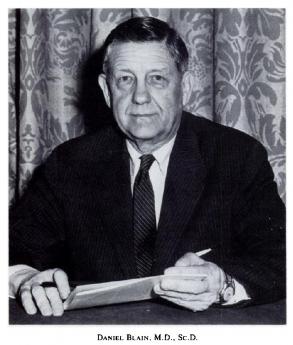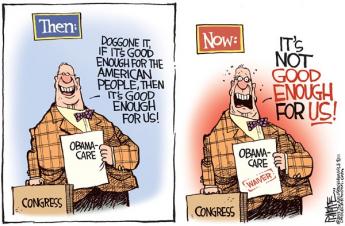2 Volumes
Health Reform: A Century of Health Care Reform
Although Bismarck started a national health plan, American attempts to reform healthcare began with the Teddy Roosevelt and the Progressive era. Obamacare is just the latest episode.
Second Edition, Greater Savings.
The book, Health Savings Account: Planning for Prosperity is here revised, making N-HSA a completed intermediate step. Whether to go faster to Retired Life is left undecided until it becomes clearer what reception earlier steps receive. There is a difficult transition ahead of any of these proposals. On the other hand, transition must be accomplished, so Congress may prefer more speculation about destination.
Medical Economics (2)
New topic 2013-04-09 21:37:40 description
Psychiatry: Last Cow in Philadelphia
The present problem with PSYCHIATRY can be summarized as follows: At the suggestion of the American Hospital Association, Congress introduced the DRG system of paying for inpatients by diagnosis, rather than itemized services. It worked well except for psychiatry, where the diagnosis usually implies little relation to the later costs it generates, so an exception was made. The dual system of payment created loopholes which unfortunately overpaid psychiatric hospitals and were described as exploitation. Congress over-reacted in a way that was unsustainable, and essentially all of the psychiatric hospitals of the nation were forced to close. This is not a history for anyone to be proud of, and the lack of outcry is also a disappointment. However, after twenty years without reform, evidently, nothing is going to be done without an outcry.CONVENE BLUE RIBBON COMMISSION TO REPAIR PSYCHIATRIC INPATIENT CARE. The 1983 BRA switched hospital inpatient reimbursement to payment by diagnosis (DRG). Abuse of the psychiatric exclusion then led to "corrective" legislation which has essentially reduced American's psychiatric inpatient care to an underfunded national disappointment. The problem is not an easy one, so a commission should devise a workable methodology for psychiatric hospitals, relying neither on present approaches nor on DRG. But overpayment is a better outcome than no care at all. Homeless people sleeping in cardboard boxes on downtown steam grates are the consequence any visitor to the area can observe at night after the commuters go home. Psychiatric social workers readily recognize their daytime patients in the boxes.
* * * * *

|
| Daniel Blain, M.D. |
Daniel Blain, M.D. (1898-1981) was just about the most important psychiatrist in America. He was the Physician in Chief of the Institute of the Pennsylvania Hospital at 49th and Market, the first and in many ways the most prestigious psychiatric hospital before it was closed. Before that, he was the first Medical Director of the American Psychiatric Association, itself the first (1844) medical society in America. His fame rested on organizing the disorganized psychiatry of the Veteran's Administration into a chain of advanced "Dean's Hospitals", a huge and very important achievement. Before that, he had achieved considerable fame as the man who took the dilapidated State Psychiatric Hospitals with a reputation as "snake pits" and made them a respectable part of the medical community. And before that, he had been born in China as the son of missionaries. As a matter of fact, even before that, he was a descendant of General Mercer of Revolutionary War fame.
Dan was an outstanding example of the peculiar fact that Psychiatry was dominated by social upper crust psychiatrists in Philadelphia for a very long time. In fact, Benjamin Rush of the 8th Street branch of the Pennsylvania Hospital is known in some circles as the "Father of Psychiatry", while in other circles he is known for signing the Declaration of Independence. That isn't true in other cities, and it definitely isn't true in New York City, where the psychoanalytic school of Sigmund Freud took that city by storm, and essentially drove every other school of psychiatric thought out of town, out of medical schools, out of psychiatric hospitals. The famous sixteen-year psychoanalysis of Woody Allen is an example of the extremes of that fad. Every profession has petty civil wars of that sort, best left undiscussed in public. But in the case of psychiatry, it was indirectly a material contributor to the present disappearance of inpatient psychiatry, and the related appearance of lots of homeless people on steam grates. Let me give a biased view of what is a massive human tragedy, which someone else can "rectify" if he chooses.

|
| APA |
It starts with a Budget Reconciliation Act of the 1980s, which brought us the DRG (Diagnosis-related) system of paying for hospitalized patients. The idea was that appendicitis resulted in essentially 7 days in the hospital, give or take a couple of days, and the bills for admission for appendectomy were for more or less the same amount. If you had fifty or a hundred cases a year in your hospital, the high bills balanced the low bills, and the overall hospital reimbursement was essentially the same without itemizing the bandages and whatnot. Congress bought this package, and after it got going, just about all hospital bills were reimbursed at one of three hundred prices, the cost to the government was the same, and there was a whole lot less bookkeeping and accounting cost. It was a success, except for a few cases where the costs did not closely line up with the diagnosis, and psychiatric hospitals were where they concentrated. So, psychiatric hospitals were excluded, and psychiatric bills skyrocketed. This experience has been carelessly cited as an example of the evils of payment by service ("fee for service"), when in fact the duration of psychiatric hospitalization is related to features of the condition, like danger of suicide, rather than the diagnosis itself. Psychiatric leadership at the time contained many in a subset of physicians who did not think much of inpatient psychiatry in the first place and even less of lobbying, and they underestimated the severity of the assault on the specialty. Apparently, no workable formula for pricing inpatient psychiatry has since been brought forward to be approved by a Congress which is more accustomed to getting its lobbying in the form of one-liners. And would you believe it, psychiatric inpatient care soon disappeared.

|
| Pennsylvania Hospital |
That's right, if someone in your family needs psychiatric hospitalization, I wouldn't know where to tell them to get it -- at any price. From considerably overpaying for psychiatry inpatients to paying scarcely anything for them, this little change of the regulations caused every psychiatric hospital I know of by name, to close. It helped balance some state budgets, but it also was a considerable factor in filling the steam grates of American cities with people who sleep on cardboard boxes. And what it illustrates is that this is what political society always seemed to do, before Dan Blain and a small group of upper-crust psychiatrists were temporarily able to shame them into something better. In fact, if there is any tattered remnant of good inpatient psychiatric care left in America today, it is in the Veterans Hospitals that Dan was able to straighten out.
Dan Blain will probably eventually be bypassed as a curiosity, like his wife. She was a Wister Logan Blain, descended from families who ruled Philadelphia a hundred years before even General Mercer came along. So the Blain couple lived on an enormous farm plot, centered at 20th and Olney right next to LaSalle University, which is built on their property. It also contains the Peale House, where Charles Willson Peale lived as the elected president of the rebel faction of the American Revolution. Peale didn't know what he was supposed to do, so he resigned and painted portraits of people. The Blains enjoyed keeping a cow on their land, the last cow in Philadelphia, and the LaSalle students enjoyed stealing the cow and leaving it on the top floor of a dormitory, for laughs. Meanwhile, the Blain couple had cocktail parties on their front porch for visiting dignitaries. They usually wore blue jeans, and Mrs. Blain, the absolute Queen of Philadelphia society, was occasionally observed to pour vodka into her glass of beer. That sort of background may well have been useful when psychiatry needed to be built up and humanized, but it became a liability when the rest of inpatient psychiatry failed to appreciate what was knocking on its door.
Higher-cost Health Insurance is What's Mandatory

|
| Obamacare |
Millions of people were unexpectedly canceled by health insurers at the onset of the Obama Insurance Exchanges. The President repeatedly told the public under Obamacare they could keep their old plans if they wished, even after notices to the contrary were mailed out. Insurance spokesmen firmly responded that the terms of the law required they could not keep the old plans for a single day. This promise was reinforced by the original section 1251 but later amended in confusing ways. The public had been told nothing like that during a three-year opportunity to be open about it; in their view, it was sprung on them. Maybe they had even been lied to; more likely, someone objected, causing revision that could be interpreted in several ways. In any event, postponement of the large-employer plans made it moot for the customer but not for the voters. To quell the uproar, the President quickly delayed the cancellations for a year, then extended the suspension, and soon provoking alarmed announcements from the insurance industry that such insurance would lose money. It suddenly became a question whether he could make the insurance companies take them back, and some said they wouldn't, even for just one year. It all sounds like an uproar on the other side of the curtain. The irresistible conclusion emerges there is more to this arrangement than is revealed, with further surprises to be feared. After all, the old rates had been set by the insurers, so something extra must have been added by someone else, but possibly it triggered some clause in the risk corridor provisions. Long accustomed to caveat emptor from salesmen, the public will have trouble getting over the assumption that insurers had been promised more expensive products to sell, in return for doing something of value for the Obama administration we haven't yet learned about.
In a world long accustomed to government anti-trust constraints, that higher prices with less competition could be mandated by law was almost too good for insurance companies to imagine. But now, after the deal is suddenly "postponed", any other industry groups who may have negotiated secret accords, are warned of the price: they must expect to absorb some costs whenever this President is forced to abandon his side of a bargain. The National Journal recently quoted an interview with an insurance lobbyist that large amounts of insurance money helped finance Tea Party meetings, suggesting internal dissension within the industry.
In any event, the canceled policies were almost entirely individual policies in the end, and the ultimate goal is speculative. A different way of expressing the thought is, a large collection of individual policies can more easily resist pressures to cross-subsidize other favored clients. One thing is almost uniformly true of persons who hold individual (as opposed to group) policies: they pay for health coverage with after-tax dollars and therefore are out of pocket by 20-30% extra for equivalent insurance. Many of them may well resist higher-priced products for that reason. Eliminating individual policies would cost the government considerable tax money and indirectly raise premiums. There must be some other motive for animosity toward individual policies, but we will have to wait to find out what it is. It may be just as simple as reducing the visible cost gap between the old system and a new one.
What Price Success?
One of the best ways to wreck a good plan, is to fail to provide for success. Most innovators spend so much anxiety over possible failure, they never get around to planning for the problems created by the plan's roaring success. So, let's voice some concerns about where the Lifetime Health Savings Accounts might stand if everything worked perfectly.
In the first place, there could be a conflict between the small investor's best interests. On the one hand, he will undoubtedly do better for himself by purchasing index funds than individual stocks. He gets diversification and low fees, supported by mountains of evidence that only a rare investor will do better with stock-picking and market-timing, no matter who is advising him. But if myriads of people do the same, index funds could overwhelm the market. Already, they represent several trillions of dollars and show no signs of slowing the pace of advancement. The proportion of stockholders who actually vote their shares will steadily shrink, and ultimately we can expect the few shares that are voted, to be in the hands of managers and insiders of the company. Now it is probably true that the average small investor knows so little of what is going on, that both he and the companies are better off if he doesn't exercise an uninformed vote. A more likely danger is imperfect agency on the part of the managers of the funds. Wall Street periodically circulates rumors of fund managers offering to vote the fund proxies, in return for the selection of their fund for the affected company's pension fund assets. It doesn't matter whether this is true, what matters is it is believed. Sooner or later, Congress will get wind of such rumors and pass inhibiting legislation. The nature of such regulation and/or legislation is ultimately to impair the value of the stock. The salaries of CEOs may go down, and some Wall Street predators may be thwarted, but overall return on investment will be lessened by the suspicion.
The bond market is much larger than the stock market because leverage is the basis for a great deal of profitability. No one knows what the optimum ratio of bonds to stocks should be. In 2007, the ratio of bank leverage was fifty to one, and few people complained it was too much. In the depths of the 1930 depression, it was far lower, and few people complained it was too low. In retrospect, fifty times is insanely high, while if you bought any stock at all in 1939, you probably made a ton of money. The herd instinct always seems to drive this relationship to extremes, but in fact, the optimum ratio will also go up and down with the times. Any law setting limits will be meaningless for long periods of time, and then suddenly be a serious impediment to the economy. The problem lies in the reality that bond trading is, with few exceptions, a zero-sum game. For you to win, someone else likely has to lose. By contrast, the stock market represents company ownership, and it is possible for both sides of a trade to be highly satisfied with their outcomes. It certainly isn't guaranteed, but the environment is more favorable for a passive investor. The long-run hazard lies in the possibility that nearly all investors will go to school and learn these aphorisms, thereby undermining the bond market except for insurance companies, banks and other long-term investors, who can hold a thirty-year bond to maturity. A flight from bonds would inevitably make their prices drop, followed by a shortage of bonds, which would then make their prices soar. Carried to an extreme, and protracted for a decade, a disturbance of this sort would cause the buy-and-hold stock investor to lose the faith, and ultimately to lose his shirt.
You have to feel sorry for the traditional stockbroker and investment advisor. The advent of the computer and of low-cost diversified funds have badly shaken what has long been an honorable and respectable profession. However, stockbrokers have resisted adopting the legal role of fiduciary, pledged to put the customer's interest ahead of his own. Most of the major stockbrokers started as private offices to handle the affairs of one rich family, who essentially didn't care about the fees and commissions. As a favor to rich friends, they enlarged the business and utilize economies of scale. In consequence, almost all stockbrokers could hope to get rich from trade secrets. With the advent of computers and high-speed trading, the broker trade became an investing profession, graduates of business schools and even mathematics majors from Ivy League Universities. The secret of success in that environment was volume, not trust-fund babies as friends and former classmates. Pension funds in particular aggregated a large number of obedient clients for them; the salary scale was still opulent, but the clientele was no longer their equals in sophistication.
As the brokerage house with walnut panels and oriental rugs began to fade away, the social level of the broker was no longer so important, and high fees interfered with maintaining high volume. It is only a matter of time before the personal financial manager discovers a small volume of potential clients, including trust-fund babies with some investment training of their own. The surviving financial advisors are only cogs in a big machine. In the meantime, be careful of whose advice you take, especially if he steers you away from index funds. There is a significant risk the advice is really coming from the sales manager, unloading the firm's inventory. The most lurid example is what has happened to 401(k) pension plans, where the investment return is heavily consumed by fees, altogether too often. It would certainly pay to browse through a book by Ibottson, containing all of the statistics you need about the last century. Since 1926, large-cap stocks have averaged 10% total return, while somewhat riskier small-capitalization stocks have averaged 12.5%. Your interview with an advisor can't be considered finished until you are told what the 15-year experience has been at that particular fund. Unless you are determined to get the data, you probably won't get it. Because of this behavior, the famous investor Warren Buffett tends not to buy stocks and bonds at all. He buys the whole company. The results of his investment fund, Berkshire Hathaway, are a rather close match to the returns which Ibottson reports.
Ok, ok, got that. But suppose everyone gets it? In that case, one would suppose the prices of common stocks would fall, and the prices of bonds would rise to a new level. At that point, the advice would be to buy funds which hold huge amounts of bonds of all maturities and hold them to maturity. Remember, investors in Health Savings Accounts would effectively be investing for the next sixty to eighty years. Someone must be found to change the composition of the portfolio rather drastically and to do so gradually enough to avoid convulsing the market. Panics are essentially what happens when everyone tries to get out the door at the same time. Are we to risk the entire savings of the nation for healthcare, based on that sort of opinion? It seems pretty clear to me that we have to trust someone, but it is not clear to me how we can assure ourselves that the person or persons with authority, will be sufficiently unaffected by politics -- to be trusted.
Which brings up the Federal Reserve. It would be hard to find a group of more serious people, generously infused with a strong sense of duty and fidelity. But strong differences of internal opinion regularly surface, not necessarily following a political ideology, as much as creating it. After all, some of this stuff is really hard. In the full century since the 1913 creation of the Fed, the dollar has declined a thousand percent, from the value of one dollar to the value of one penny. John Kenneth Galbraith, one of the wittiest civilized men on earth, loudly and earnestly advocated a deliberate 2% inflation in the value of the dollar. Well, we have it, and the dollar has completely severed its connection to gold and silver or any other commodity. The currency has now just become a computer entry when thousands of years of experience speak to the hazard of doing so.
When the dust settles, there remain two reasons why we should take such risks. The first is the rather good possibility we can indeed extricate ourselves from a looming health finance disaster, by taking this risk. The second is to reflect on the growing possibility that medical research can eliminate enough disease, and reduce the cost of caring for what is left, to give us the room to ease into sustainable finances. If that's our grand strategy, only America, using American bravado, could pull it off.
3 Blogs
Psychiatry: Last Cow in Philadelphia
 Daniel Blain, just about the most famous psychiatrist in America, lived at 20th and Olney, West. Not only was that the place he lived, but he also kept a cow there. And this was within living memory.
Daniel Blain, just about the most famous psychiatrist in America, lived at 20th and Olney, West. Not only was that the place he lived, but he also kept a cow there. And this was within living memory.
Higher-cost Health Insurance is What's Mandatory
 Cancellations of millions of health insurance policies show the Affordable Care Act aimed to mandate a few specific types of policies, and not merely to the uninsured. Without a government subsidy, most plans would cost more. The promise that you can keep your old plan, and keep your doctor, was an empty one.
Cancellations of millions of health insurance policies show the Affordable Care Act aimed to mandate a few specific types of policies, and not merely to the uninsured. Without a government subsidy, most plans would cost more. The promise that you can keep your old plan, and keep your doctor, was an empty one.
What Price Success?
If everybody buys diversified stock funds, and never votes at the annual meeting, who owns and controls the company?